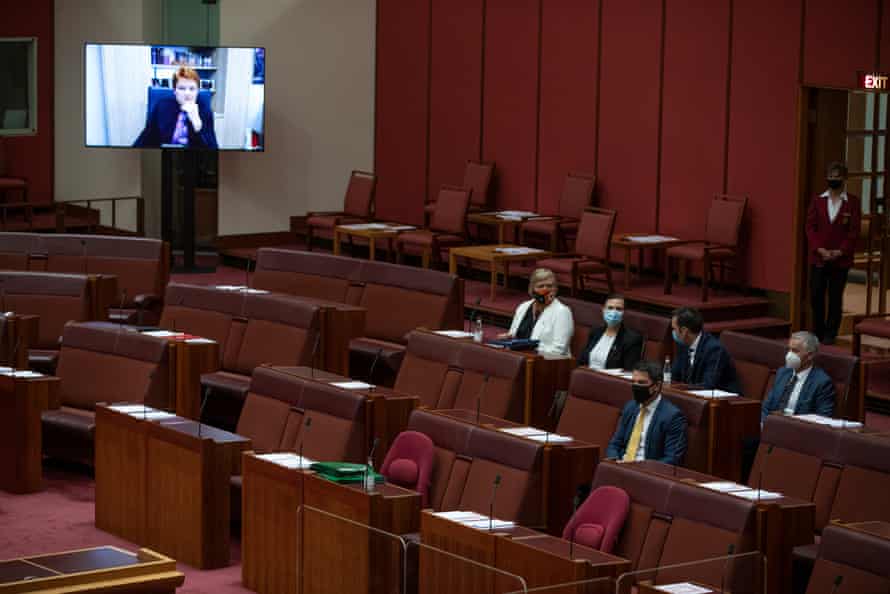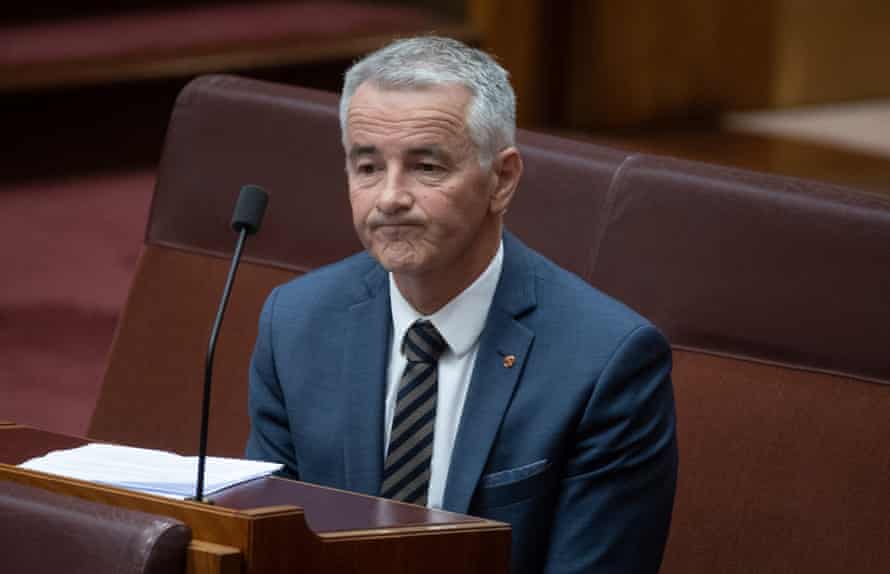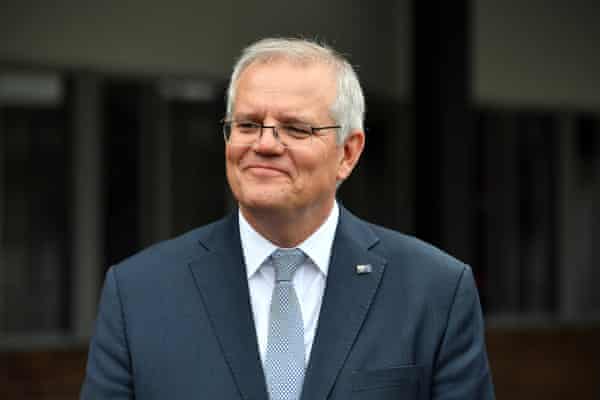Conspiracy, Covid and the Coalition: why are more of its MPs appealing to the alt-right?
Scott Morrison is fond of telling the Coalition party room that disunity is death in politics, and that all MPs need to help “make the boat go faster”.
But as the 46th parliament winds down before the 2022 election and Australia reopens from coronavirus restrictions, the government faces a growing revolt from its own members about its handling of the pandemic.
This week senator Gerard Rennick campaigned against the approval of the Pfizer vaccine for children, senator Alex Antic appeared on former Trump advisor Steve Bannon’s War Room: Pandemic, and Nationals MP George Christensen spoke with American conspiracy theorist Alex Jones, encouraging people to protest outside Australian embassies against what he portrayed as a loss of freedom.
Speaking from hotel quarantine in South Australia, Antic accused state governments of a “drift into authoritarianism”, arguing that an “unelected health bureaucracy” had sent him to what was essentially a “detention facility”.
“We need to drain the billabong in this country,” he said, mimicking Donald Trump’s election slogan. “It’s as simple as that.”
Christensen laughed as Jones compared Australia’s Covid-19 quarantine facilities to Auschwitz because they both had “big fences”.
“The rest of the free world, please stand with us, please support us, and every time we see people out there protesting, whether it be in front of an embassy or elsewhere, protesting for our rights in Australia, it really does embolden the patriots, the people who are for freedom in our country to stand up,” Christensen said.
Rennick gained more than 70,000 Facebook followers in a month as he posted about reports of adverse events from vaccination, which he admitted he could not be sure were “100% accurate”. Both he and Antic have refused to vote for government legislation, and in the final sitting fortnight of parliament three others joined them to cross the floor and vote with One Nation against vaccine mandates.

What is the motive?
Experts say it appears fringe elements within the government are appealing to the radical right to shore up support against challenges from minor parties, including the United Australia party and One Nation.
Dr Josh Roose, a senior research fellow of politics and religion at Deakin University, says “fringe messaging and blatant populism” is designed to address “a serious concern in the Liberal party that many of their constituents are drawn to the UAP”.
“They’re quite clearly attempting to appeal to voters who might be lost to them, through their forms of independent or faux media.”
With the non-major party vote at an all time high, minor parties like the UAP are within reach of Senate seats in states including New South Wales and Western Australia. Their preferences could also influence the outcome in marginal lower house seats.
In Queensland, the assistant attorney general, Amanda Stoker, and the One Nation leader, Pauline Hanson, are both up for re-election, duelling for one or two Senate seats against the UAP and former Liberal state premier Campbell Newman, now lead candidate for the Liberal Democrats, who are also anti-lockdown.
But Roose says there is also a genuine convergence of views, and elements of the Liberal and National parties are “highly influenced by fringe movements”, particularly in America.
“The alt-right characters seeking to build momentum here stand fundamentally opposed to liberalism, pluralism, constitutionalism,” he says.
Roose warns the radical right is “drawing direct inspiration” from the US, seeking to “replicate tactics, to polarise, to divide, to exploit people feeling a bit angry and alienated after two years of lockdown”.
Lise Waldek, a lecturer in terrorism studies at Macquarie University, says when politicians from mainstream parties appear in “counter-media”, such as shows presented by Bannon or Jones, it provides “an opportunity for extremists … to mainstream their beliefs”.
It “gives credence to an infrastructure directly in opposition to things we value in liberal democracy,” she says.
Dr Julian Droogan, an associate professor of terrorism studies at Macquarie University, says there has been “strong growth in conspiratorial sentiment in far right spaces online” which has “leaked out beyond the far right to the broader public”.
“There is a clear risk involved in politicians of any sort attempting to … align themselves with these movements, because they are inherently conspiratorial and anti-establishment.”
Chris Cooper, the executive director of Reset Australia, which raises awareness of digital threats to Australian democracy, says the rise of fringe influencers has been “fuelled by social media algorithms in the first place”.
“[They’ve] pushed them into echo chambers where the most sensational, outrageous and conspiratorial content is amplified because it’s the most engaging and that’s the business model to keep us online.”
Cooper says politicians such as Christensen and MP Craig Kelly, who was banned from Facebook due to Covid-19 misinformation and left the Liberals for the UAP, have capitalised on that. Even posting content that rates well in the US helps boost their audience in Australia among those with similar views on vaccines, lockdowns or climate change.
Cooper says Rennick appears to be appealing to members of the public who are misinformed or fearful of vaccines and “trying to leverage that for his own influence”.
“He’s leaning into fear and outrage, which is what the algorithms are built to do and prioritise. It is grossly irresponsible from an elected representative.
“But it’s hard to see that it’s really anything more than him trying to seek some relevance with an audience looking for voices in parliament to legitimise their misinformed views.”
Rennick has denied he was sharing the posts to increase his public profile, saying he was “moved” by people’s stories and was “shocked about the mistreatment” of those who had experienced what they perceived as adverse events linked to the vaccine.

The leaders’ response
When controversies involve his own MPs, Morrison’s first instinct is often to defend them on free speech grounds – which he did when Labor criticised those attending the Conservative Political Action Conference in 2019 and again in July when Christensen attended anti-lockdown rallies in Queensland.
The Nationals leader, Barnaby Joyce, has previously said he won’t demand Christensen desist from contradicting public health advice because the Coalition governs with a “thin margin” and if you “start prodding the bear, you’re going to make the situation worse”.
This latest crop of controversies has drawn some condemnation from the top of the government, but failed to silence the rogue MPs.
The acting Nationals leader, David Littleproud, counselled and condemned Christensen over his comments, warning the appearance was an “error of judgement” and “there are limits and there are boundaries” that must be observed.
Christensen later wrote on his Telegram channel that the criticism had been “fake news”, “political elitist handwringing” and “hyperventilation”.
At a press conference about the harms of social media on Wednesday, Morrison said he thought Jones’s comments comparing quarantine to a concentration camp were “appalling”.
“I have spoken to George directly about them,” he told reporters in Sydney. “I think they’re absolutely appalling. George is not a candidate for the LNP at the next election and I think George should quietly go into retirement.”
A spokesman for Morrison tells Guardian Australia the government “will continue to listen to the medical experts on these issues and strongly suggests Senator Rennick does the same”.
Rennick says he does not intend to stop social media advocacy on adverse events and rejects the label of misinformation, despite officials assuring him the Pfizer vaccine is safe for children.
“These are people’s stories and [the charge of misinformation is] an insult to those people,” he says. “It’s medical gaslighting of people who are having trouble getting their adverse events recognised.”
When questioned about Antic and Christensen, Morrison also implicitly argued that traditional media should ignore them rather than try to hold him accountable for government members.
“Well, I don’t think it’s a good idea to promote what they’re saying by constantly drawing it to people’s attention,” he said. “I’m not seeking to do that. I don’t agree with them.”

Roose says the federal Coalition is “running scared” of losing the balance of power to minor parties, warning that anything less than “complete condemnation” could be viewed as “tacit support” for radical views.
“A light has to be cast on this sort of behaviour. If it’s allowed to fester … it will grow worse, and it will disease the entire body politic … it has to be stamped out.”
Droogan says it was heartening in the case of Christensen that “the message has been to disavow, call out and reject it”.
“If going on these sorts of conspiratorial media shows and counter-media is not called out, then effectively what could happen is shifting of that Overton window of what is considered possible and normal.”
Cooper says: “Any leader of any government has to take responsibility for the irresponsible misinformation of any of their members; the same is true of the opposition or any party.”
Misinformation is “rife” in sections of social media.
“By there being no accountability measures, no calling it out … it leaves that misinformation to thrive within echo chambers and communities which are only going to be more entrenched and ill-informed.”


